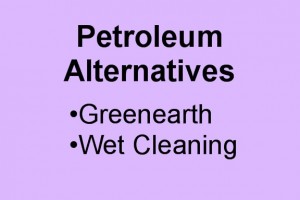Some wedding dresses have care labels that state “Dry clean only with Petroleum solvent”. If your wedding dress has these instructions on the care label, you might have some questions about that.
- What is petroleum solvent?
- Why bridal gown manufacturers recommend it?
- How to find petroleum solvent?
- Are there alternative solvents that work as well?
What is Petroleum Solvent
Understand that the term dry-cleaning doesn’t mean that your dress stays dry during cleaning. It means that water is not used for the cleaning. So petroleum solvent is cleaning your wedding gown in a solution that is petroleum based. Think gasoline… In fact the dry cleaning industry was born when a French business man noticed his tablecloth was cleaner after the maid spilled kerosene on it. He introduced cleaning garments using gasoline and kerosene, which became known as dry cleaning because the cleaning solvent was not water.
In the 1930’s a nonflammable solvent was adopted for this purpose – called perchloroethylene, or perc for short. But in recent years perc has been blamed for environmental and health concerns, and petroleum solvents have emerged again, newly formulated, less flammable, safer for the environment and your health than perc.
Why Petroleum Solvent is Recommended
The reason bridal gown manufacturers recommend petroleum solvents for wedding gowns is because Petroleum solvents are safer for beads and sequins than perc. Perc can melt beads and sequins, but petroleum solvents do not.
Some wedding gowns may have a tag that states “Dry clean only with Petroleum solvents” but that dress may not have beads and sequins. it is likely that the manufacturer uses the same tags for all their wedding dresses. So that wedding dress an safely be cleaned with perc.
How to Find Petroleum Solvent
To find a dry-cleaner who uses petroleum solvent pick up the phone and call your dry-cleaners. Ask them which solvent they use. Be familiar with the petroleum solvent options. There are several names for petroleum solvents:
- solvent
- Hydro-carbon
- DF-2000
- Eco-solve
Stoddard is the oldest and not very common. But Hyrdro carbon is becoming once of the most common new solvents. DF-2000 and Ecosolve are brand names of hydrocarbon solvents. They have only been around for the last decade or so and many newer dry-cleaning shops are using one of these solvents. Some states have passed laws banning percloroethylene and so these new solvents are becoming very popular. They are better for the environment as well.
Alternatives to Petroleum Solvent
There are alternatives to petroleum solvents that work just as well. Greenearth solvent is silicone based but is also safer for beads and sequins than perc. It is also the safest for the environment, leaving non-toxic, non-hazardous waste. And of course water, which is also a solvent, protects beads and sequins as well.
Heritage Garment Preservation
Here at Heritage Garment Preservation we clean wedding gowns by hand with water or dry-clean with Greenearth solvents – or a combination of both. Both water and Greenearth solvent are safe for beads and sequins and for the environment. We decide which solvent to use based on your wedding gown fabrics, trims and of course stains. We would love to give our tender loving care to your wedding gown.
Learn More about Dry-Cleaning and Petroleum solvents

